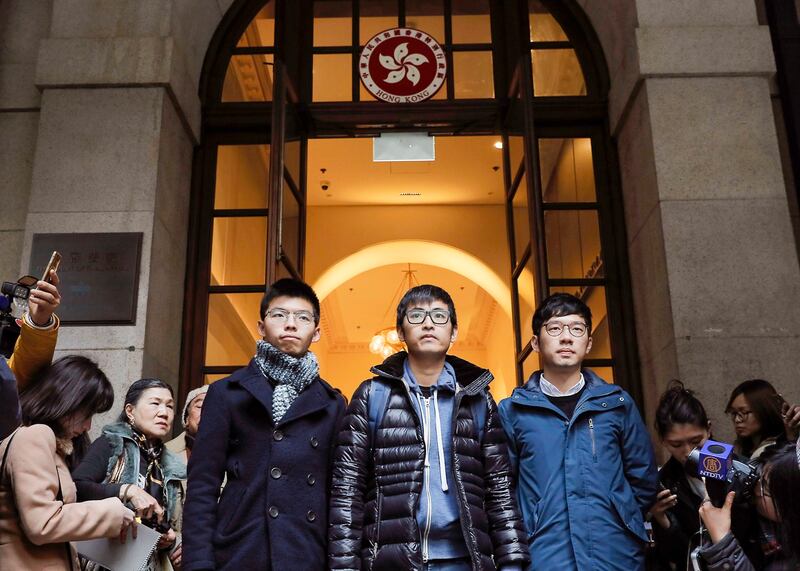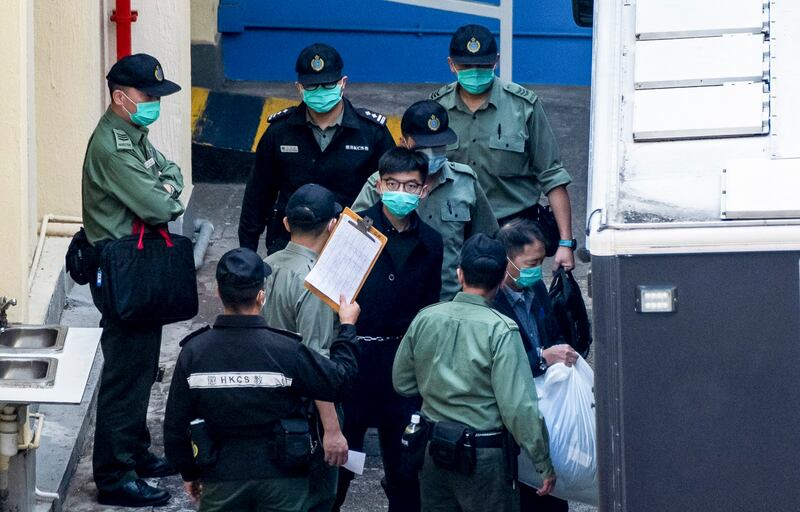The 2014 Umbrella Movement in Hong Kong was about standing up and resisting the city's fate as a democracy-free zone under Chinese rule, former student leader Alex Chow told Radio Free Asia in an interview marking the 10th anniversary of the protests.
Now, overseas activists are continuing that work for their comrades in prison, he said.
Chow was head of the Hong Kong Federation of Students and vice president of the Hong Kong University Student Union when the ruling Chinese Communist Party issued a plan on Aug. 31, 2014, outlining electoral reforms.
They would give everyone a vote – but they would choose from among government-approved candidates.
The decision came despite earlier mass protests for fully democratic elections, including a sit-in the Central business district on July 1, 2014, organized by Chow.
While the annual mass march was allowed to go ahead, the sit-in that followed was forcibly broken up by police. It was a brief preview of what was to come as the city's pro-democracy movement pivoted towards large-scale civil disobedience.
The public backlash took the form of a student strike, camps on major roads, sit-ins, mass rallies of hundreds of thousands of people and an unofficial referendum that came out overwhelmingly in favor of open nominations for electoral candidates.
While the authorities refused to back down, saying there was ' no room' for discussion on the electoral rules, police kept up the pressure by firing tear gas and beating protesters, in clashes that began this week 10 years ago.
To protect themselves, demonstrators used umbrellas, and the "Umbrella Movement" was born.
Reaching the limits of patience
Chow, who had been about to start a PhD at the University of California in Berkeley, served a seven-month jail term for the storming of Civic Square outside government headquarters, which kicked off the movement on Sept. 26, 2014. Fellow democracy activist Joshua Wong got six months and Nathan Law eight months.

His sentence was later overturned by the city's Court of Final Appeal, and he eventually left Hong Kong for good.
"The whole meaning of the Umbrella Movement, even at the time, was closely linked to the idea of resisting our fate, of not just accepting [the Aug. 31 decree]," Chow told RFA Mandarin in a recent interview.
"It was about the people of Hong Kong being in charge of their own destiny, and it showed that they had reached the limits of their patience, and would no longer tolerate a situation in which their fate was decided by colonizers."
Hong Kongers, who were shut out of their own political process in the early years of British colonial rule, enjoyed increasing democratic representation from the 1980s until 2021, when the authorities rewrote the electoral rules to bar opposition candidates from running for public office, saying only " patriots" loyal to Beijing would pass the complex political vetting process.
"The people of Hong Kong wanted to take back their autonomy," Chow said, in a reference to promises of a "high degree of autonomy" made by Beijing before the 1997 handover to Chinese rule. "That has always been the starting point ... for resistance by the people of Hong Kong over the past decade."
"The Umbrella Movement was about refusing to accept that fate, and the 2019 protests showed that the only option they had left by then was to resist desperately," he said.
Another path
While former Umbrella Movement student leaders like Nathan Law, Agnes Chow and Joshua Wong took the movement forward by forming a new political party, Demosisto, and running for seats in the Legislative Council, Chow thought there had to be another way.
"There was some discussion after 2014 about whether or not student leaders should run for election, but ... that wasn't the answer for me," he said. "I felt that my contribution would be to look back at the shortcomings of our organization, and the methods used by mass movements."
"I chose to go to the United Kingdom and the United States to study for my masters, then my PhD, and find my answers that way," Chow said.

Chow has spent the decade since the movement thinking and discussing the Umbrella Movement in depth, in a bid to find a better way to run such mass campaigns.
"We have learned our lesson, which is that the regime is going to cling very tightly to its power, and it won't share power or govern along with the people [of Hong Kong]," he said. "As rebels and advocates, should we hang in there, or should we back off and surrender at certain points?"
But the main thing stopping overseas activists from focusing on something else is the sheer number of their comrades who remain behind bars back home, jailed or arrested in an ongoing crackdown on public dissent and peaceful political opposition that began under the 2020 National Security Law, and has continued this year with the Article 23 legislation.
"Of course the regime retaliated, and the political leaders and my former comrades now in prison are the scapegoats of the movement," he said. "They can't leave Hong Kong."
"Besides being sad for them, it's about how we can actively channel their suffering into a force that fuels the pro-democracy movement. How those of us in the resistance movement overseas can put that energy back into the movement, and give it back to those who stayed behind, and who are suffering."
"That's the only thing we can do right now," Chow said.
Translated by Luisetta Mudie. Edited by Malcolm Foster.
